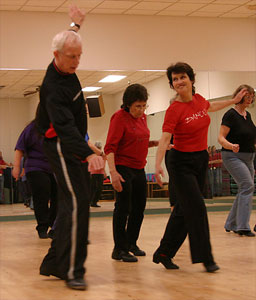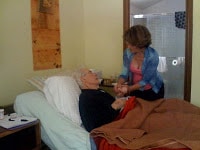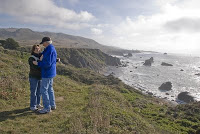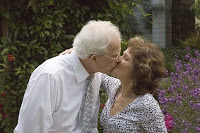Posts Tagged ‘Robert Rice’
Open Letter to My Line Dancers
Dear Line Dancers,
Thank you for sharing Friday’s class with me. I wanted it to be special as we neared the one-year anniversary of Robert’s death, so I announced that we would devote the whole evening to the contemporary line dances that Robert choreographed for us.
Instead of reteaching the familiar ones that we dance frequently, I brought back some older dances: Night Traveler from early 2001 — the first line dance we choreographed together, before we became a couple. Oh, how I already fantasized sharing more than dance steps with this vibrant, dancing man who brought grace, skill, and enticing hip rolls to our class.
I also taught the lovely Baby Grand, I imagined Robert teaching this slow, graceful, jazz-style dance to the class in 2005, before we knew how few years he had left. As I looked around, I saw other dancers wiping their eyes and I knew we were all dancing with Robert.
When we closed with Music to My Heart, his most popular choreography among our dancers, I couldn’t hold back the tears. Several dancers hugged me, others looked about to fall apart themselves. In the room were people who had never experienced dancing with Robert because they had joined the class after Robert had left it, but they, too, seemed moved and grateful to know him better through his choreography.
After class, I started bawling in the locker room, and cried all the way home. Then later that evening, I realized something: The one-year anniversary of Robert’s death is also the 8-year anniversary of our first kiss. Now that is a day to celebrate, not mourn! I felt that the intensity of the line dance class had helped me purge the grief and invite the light of the love we started sharing with that first kiss on August 2, 2001.
You can see videos of some of Robert’s dances from my line dance page. Many, however, were before the days of ubiquitous digital videocameras and YouTube. I’ll update this post if we record some of these older dances — we do have a plan in the works.
This excerpt from Mary Oliver’s poem, “In Blackwater Woods,” resonates with me today:
To live in this world
you must be able
to do three things:
to love what is mortal:
to hold itagainst your bones knowing
your own life depends on it;
and, when the time comes to let it go,
to let it go.
First anniversary of Robert’s death
 “Will you be able to say goodbye when it’s time?” I asked Robert softly, holding his limp hand in both of mine.
“Will you be able to say goodbye when it’s time?” I asked Robert softly, holding his limp hand in both of mine.
I couldn’t tell if he was thinking about his answer, or drifting in and out of consciousness, or even if he had heard me.
“No,” he said finally, without opening his eyes.
It was a few days before Robert died last August 2, and we both knew he was close to the end. Hospice — such wonderful people! — kept him painfree as his bones deteriorated and his body processes shut down. He drifted between asleep (or unconscious) and half-awake, sometimes painting in the air with his fingers, sometimes thinking it was time to go to dance class or out to lunch (though he hadn’t been out of bed or eaten for a week), occasionally jumping into clarity for a few precious moments.
As Robert’s cancer progressed, I felt trapped in a nightmare that I couldn’t escape or rescue my beloved Robert, who was slipping away from me day by day, hour by hour.
Now, though, I am grateful that I was able to share this profound transition with him. I learned a lot about death that I never knew, never imagined. I also learned how love wins somehow, even at the end. Robert was rarely conscious over the last few days, but when he was, he murmured love to me.
Thank you, readers, for sharing with me the exhilaration and sensuality of our great love affair and far-too-short marriage. It feels right to share this part with you, too. 
If Not Now, When Do We Live Fully?
“Putting your own life/needs/emotions on hold can’t be healthy for you,” I told someone yesterday, and it reminds me of how often I find myself saying that.
A reader writes that she has a sexless and even touchless marriage, but can’t support herself financially so she’s staying. A male friend of mine in his sixties can’t decide whether his current relationship is right for him, so he doesn’t decide, he just goes along. A reader in his fifties will start exploring relationships after he moves. A woman says she will feel sexier after she loses weight. A couple hasn’t had sex for years but won’t see a therapist because they think they should figure it out on their own.
I often ask people of our age who have put their own happiness and passions on hold, “If not now, when?”
If you’ve read much of my blog, you know that I lost my beloved husband, Robert Rice, to cancer last August. He was an artist, a dancer, a thinker, and a teacher to all who knew him. As long as he could stand upright, he painted in his studio every day, creating amazing art, yet always striving for that elusive best painting — maybe his next. He painted some of his most magnificent work in his last two years.
“Do you feel like you’re living on borrowed time,” I asked Robert one morning as he pulled on his paint-splattered jeans and sweater.
“I AM living on borrowed time,” he told me. Then he kissed me and rushed off to tend his garden for a couple of hours before heading to the studio.
I’m making myself cry writing this, but I admired him (and admire him still) for always going towards his goals, his love for life and creativity, and his passion for love itself, even when he knew he was dying.
We all have a death sentence, we just don’t know when it is. As we age, though, we get many reminders of our mortality, some subtle (aches in new places, parts that don’t work 100% like they used to), some not subtle at all (a cancer diagnosis, a spinal or hip fracture, parts that don’t work at all).
It seems to me that we have a responsibility to ourselves and to life itself to live fully, productively, and lovingly — as long as we can.
As I reread this post, I realize that it’s a lesson I have to relearn in my own life now as I emerge from the dark place of grief and make my way back to life, work, sunshine, and joy.
Valentine’s Day without Robert
 My first Valentine’s Day since Robert died seemed to be going unexp
My first Valentine’s Day since Robert died seemed to be going unexp ectedly well — a deep and stimulating phone conversation with a close friend, time alone reading and dancing in my exercise room, dinner out with a dear and delightful woman pal, excitement about feeling my life force emerging strongly.
ectedly well — a deep and stimulating phone conversation with a close friend, time alone reading and dancing in my exercise room, dinner out with a dear and delightful woman pal, excitement about feeling my life force emerging strongly.
Then I came home. Alone. Lit a candle. And started to cry.
I remembered Robert lighting a candle in the same candleholder I was using. I saw his dear hand lighting it, the hand that would touch me soon. I heard his soft voice, saw his smile. I wrote in my journal memories of seven years of Valentine’s Days, especially the languid afternoons making love as daylight turned to evening and to night. Finally, even the candle would burn down, flicker, and go out as we held each other and continued to kiss in the dark.
Tears streaming, voice wailing, I put down my journal and picked up a book of poetry, American Primitive by Mary Oliver. A friend, Uta, had given it to me on Robert’s birthday, 4-1/2 months after he died, with this inscription:
Dear Joanie,
She is one of Robert’s favorite contemporary poets.
You are very special to me and when you read in this little book, Robert will be with you. He loves you very much.
I had to put down the book when I read this:
…Now you are dead too, and I, no longer young,
know what a kiss is worth.
(photos by Robert’s son Mitch Rice)



